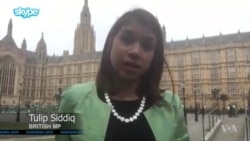A British opposition lawmaker campaigning for the release of a British-Iranian woman jailed in Iran for more than a year has welcomed signs that the British government is trying harder to free her.
In an interview with VOA’s Persian Service, lawmaker Tulip Siddiq said she was pleased that the government held a parliamentary debate Tuesday on the case of Nazanin Zaghari-Ratcliffe. Siddiq spoke to VOA via Skype video from outside Parliament shortly after the debate concluded.
Siddiq asked British Minister for the Middle East Alistair Burt why the government has not explicitly called on Tehran to release 38-year-old Zaghari-Ratcliffe, a London-based charity worker who lived in the opposition Parliament member's district.
Burt responded by saying the government is “taking the matter very seriously,” Siddiq said, and assured the chamber that British authorities were fully aware of the living conditions Zaghari-Ratcliffe has faced at Tehran’s Evin prison.
Iranian authorities detained Zaghari-Ratcliffe at Tehran's international airport in April 2016, as she was about to return home to Britain with her daughter after a visit to relatives in Iran.
An Iranian court sentenced Zaghari-Ratcliffe in September to five years in prison for undisclosed security offenses – a sentence upheld by Iran’s Supreme Court in April. British media have said she is accused of plotting to overthrow the Iranian government.
Zaghari-Ratcliffe’s British husband, Richard Ratcliffe, who also has campaigned for his wife’s release, has said Iranian authorities kept her in solitary confinement in Evin prison for almost nine months last year, before transferring her to a cell with other women in late December.
Siddiq said she was “especially heartened” that lawmakers of Britain’s ruling Conservative Party urged the government to do more for Zaghari-Ratcliffe during Tuesday’s debate – calling that a “positive step.”
In a statement earlier this year, Britain’s Foreign Office said Prime Minister Theresa May and Foreign Secretary Boris Johnson both had raised Zaghari-Ratcliffe's case with their counterparts in Iran, and “continue to press the Iranians for access and for due process to be followed.” It also said London was ready to help bring home Zaghari-Ratcliffe's three-year-old daughter, Gabriella, “if requested.” The infant has been staying with Zaghari-Ratcliffe's parents in Tehran since her mother was detained.
No British diplomats have been able to visit Zaghari-Ratcliffe in Iranian custody. British law does not automatically grant consular protection to citizens with dual nationality who are detained in countries such as Iran.
A group of 45 foreign diplomats visited Evin prison on July 5 in a tour organized by the Iranian judiciary, which said they were “amazed” by the comfortable living conditions they saw. But exiled Iranian Nobel Peace Prize Winner Shirin Ebadi said the tour excluded areas where Zaghari-Ratcliffe and other prisoners sentenced for security offenses were being held, prompting her to denounce the diplomats' visit as “state-choreographed” in a letter to the U.N. special rapporteur for human rights in Iran, Asma Jahangir.
Siddiq said the foreign diplomats asked to see Zaghari-Ratcliffe during their prison visit two weeks ago, but they were denied access. The Parliament member said this account was relayed to her by British minister Burt.
“The minister’s explanation to me was that when (the diplomats) were offered a chance to go to the prison and look around, they did not feel they could refuse," Siddiq said.
Richard Ratcliffe, who has spoken to his wife by telephone several times in recent weeks, said on Tuesday she was in “very low” spirits. He called on the British government to “finally call for the release of Nazanin and other British citizens who are being held without due cause.”
Siddiq said two other British citizens with dual Iranian nationality also are detained in Iran: Kamal Foroughi and Roya Nobakht.
This report was produced in collaboration with VOA’s Persian Service.






